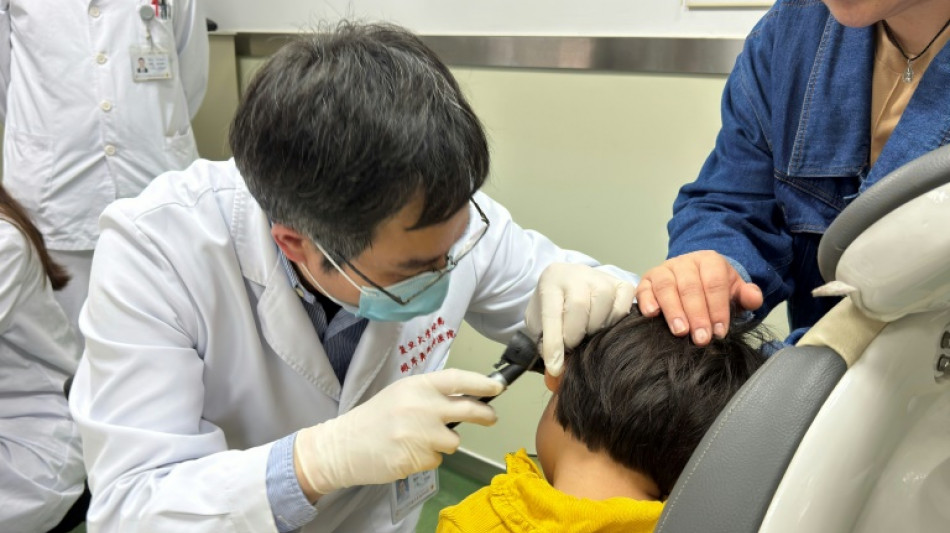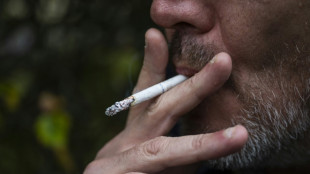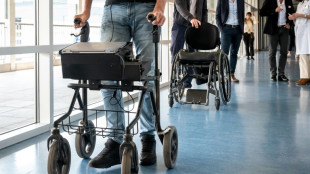
-
 Presidential vote seen as referendum on Romania's European future
Presidential vote seen as referendum on Romania's European future
-
Hamilton bids farewell to Mercedes as Ferrari vie for title

-
 New Zealand unchanged in bid to hit back against England
New Zealand unchanged in bid to hit back against England
-
Macron seeks remedy to France's political crisis

-
 New Natalia Lafourcade album celebrates music's onstage evolutions
New Natalia Lafourcade album celebrates music's onstage evolutions
-
Taiwan's Lai kicks off visit to US territory Guam

-
 Ivory Coast staple cassava meal gains UNESCO heritage status
Ivory Coast staple cassava meal gains UNESCO heritage status
-
OpenAI to partner with military defense tech company

-
 Liverpool held but Slot salutes 'special' Salah
Liverpool held but Slot salutes 'special' Salah
-
Man City needed to break losing 'routine', says Guardiola

-
 Leipzig down Frankfurt to reach German Cup quarters, Cologne strike late
Leipzig down Frankfurt to reach German Cup quarters, Cologne strike late
-
Mbappe admits penalty miss 'big mistake' as Bilbao beat Real Madrid

-
 'Sad, disappointed' Mbappe pays penalty as Bilbao beat Real Madrid
'Sad, disappointed' Mbappe pays penalty as Bilbao beat Real Madrid
-
US stocks surge to records, shrugging off upheaval in South Korea, France

-
 Liverpool held in Newcastle thriller, Arsenal inflict Amorim's first defeat
Liverpool held in Newcastle thriller, Arsenal inflict Amorim's first defeat
-
Shiffrin confirms she'll miss Beaver Creek World Cup races

-
 Corner kings Arsenal beat Man Utd to close gap on Liverpool
Corner kings Arsenal beat Man Utd to close gap on Liverpool
-
Mbappe pays penalty as Bilbao beat Real Madrid

-
 NFL Jaguars place Lawrence on injured reserve with concussion
NFL Jaguars place Lawrence on injured reserve with concussion
-
North Korea, Russia defence treaty comes into force

-
 Openda hits brace as Leipzig beat Frankfurt in German Cup last 16
Openda hits brace as Leipzig beat Frankfurt in German Cup last 16
-
Schar punishes Kelleher blunder as Newcastle hold Liverpool in thriller

-
 De Bruyne masterclass helps Man City end seven-game winless streak
De Bruyne masterclass helps Man City end seven-game winless streak
-
Syrian rebels surround Hama 'from three sides', monitor says

-
 Lawyers seek leniency for France rape trial defendants, blaming 'wolf' husband
Lawyers seek leniency for France rape trial defendants, blaming 'wolf' husband
-
OpenAI chief 'believes' Musk will not abuse government power

-
 Thousands rally in Georgia after police raid opposition offices
Thousands rally in Georgia after police raid opposition offices
-
S. Korea opposition push to impeach president

-
 Powell 'not concerned' US Fed would lose independence under Trump
Powell 'not concerned' US Fed would lose independence under Trump
-
French government falls in historic no-confidence vote

-
 Syrian White Helmets chief 'dreams' of never pulling a body out of rubble again
Syrian White Helmets chief 'dreams' of never pulling a body out of rubble again
-
NBA Suns lose Durant for at least a week with ankle injury

-
 Warhammer maker Games Workshop enters London's top stocks index
Warhammer maker Games Workshop enters London's top stocks index
-
Iran Nobel winner released for three weeks, 'unconditional' freedom urged

-
 Red Cross marks record numbers of humanitarians killed in 2024
Red Cross marks record numbers of humanitarians killed in 2024
-
Johnson's Grand Slam 'no threat', says World Athletics boss Coe

-
 Qatar's emir and UK's Starmer talk trade as state visit ends
Qatar's emir and UK's Starmer talk trade as state visit ends
-
Cuba suffers third nationwide blackout in two months

-
 Russia, Ukraine to send top diplomats to OSCE summit in Malta
Russia, Ukraine to send top diplomats to OSCE summit in Malta
-
Spanish royals to attend memorial service for flood victims

-
 LPGA, USGA new policy requires female at birth or pre-puberty change
LPGA, USGA new policy requires female at birth or pre-puberty change
-
Stick to current climate change laws, US tells top UN court

-
 British Museum chief says Marbles deal with Greece 'some distance' away
British Museum chief says Marbles deal with Greece 'some distance' away
-
Pope Francis receives electric popemobile from Mercedes

-
 Gaza civil defence: thousands flee Israeli strikes, evacuation calls
Gaza civil defence: thousands flee Israeli strikes, evacuation calls
-
Trump names billionaire private astronaut as next NASA chief

-
 Pidcock to leave INEOS Grenadiers at end of season
Pidcock to leave INEOS Grenadiers at end of season
-
Seoul stocks weaken, Paris advances despite political turmoil

-
 South America summit hopes to seal 'historic' trade deal with EU
South America summit hopes to seal 'historic' trade deal with EU
-
DAZN awarded global TV rights for Club World Cup


'Whole family cried': New gene therapy offers hope for deaf kids
Zhu Yangyang babbles away like a typical happy three-year-old, calling out for "mama" and "papa" and accurately naming colors -- a remarkable achievement considering he was completely deaf just months ago.
He is one of five children whose hearing was restored through a revolutionary new gene therapy in a clinical trial led by Chinese and American researchers, offering new hope for those born with a rare genetic mutation.
Yangyang's mother Chang Yiyi says she was moved to tears when she realized, around three weeks after the treatment last September, that Yangyang could hear her knocking on the door.
"I hid in a closet and called for him, and he still responded!" she told AFP in an interview from Shanghai.
The results of the study, published Wednesday in the prestigious journal Nature Medicine, mark the first time the procedure was performed on both ears. This led to significant improvements in speech perception and the ability to locate the source of sounds compared to treatment in just one ear.
"This is absolutely a turning point," Zheng-Yi Chen, the study's senior author at the Eaton-Peabody Laboratories at Mass Eye and Ear, told AFP, adding companies are now conducting clinical trials, including two in Boston, with the goal of moving towards regulatory approval.
"If the results hold, without any complications, I think in three to five years, it may be a medically approved product," he added.
- Rare mutation -
There are around 26 million people globally with genetic forms of deafness, with this particular therapy focusing on people born with a mutation of the OTOF gene -- roughly two to eight percent of inherited deafness cases.
This defect means they are unable to produce the protein otoferlin, which is needed for hair cells in the inner ear to convert sound vibrations into electrical signals that can be sent to the brain.
The treatment involves injecting a modified virus into the inner ear that smuggles in a working version of the OTOF gene, restoring hearing.
When they realized that Yangyang could hear for the first time, "the whole family cried" including Yangyang's mother and grandmother, said lead study author Yilai Shu of the Eye & ENT Hospital of Fudan University in Shanghai.
Chang, a 26-year-old homemaker, said that taking care of her son has become much easier since he began developing language skills, and the family soon hopes to move him from a speech rehabilitation school to traditional kindergarten.
- More genetic targets -
Shu led the research team that delivered the very first OTOF gene therapy in 2022, pioneering a treatment that has since been administered to more children around the world, including in the United States and the United Kingdom.
Treating both ears presented new challenges, he told AFP. Doubling the surgical procedures increased the risk of side effects.
However, careful dosing minimized the immune response, and only mild to moderate side effects -- like fever, vomiting and slightly elevated white cell counts -- were observed.
All five children, who ranged in age from one to 11, saw major improvements.
Two of them gained an ability to appreciate music -- a more complex acoustic signal -- and danced happily in videos recorded for the study.
Surprisingly, even the 11-year-old has gained some capacity to understand speech and talk, even though it was expected it would be too late for the brain to acquire this ability if it had never before perceived sound.
"That really shows our brain has a plasticity that maybe lasts much longer than we originally thought," said Chen. The clinical trial is ongoing, and the participants will be monitored for long-term follow up.
Meanwhile, Shu and Chen said they are working on further animal testing to develop treatments for other causes of genetic deafness, including those related to the GJB2 gene -- the most common cause of deafness present at birth.
F.Pavlenko--BTB




